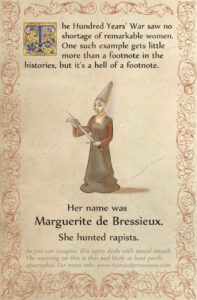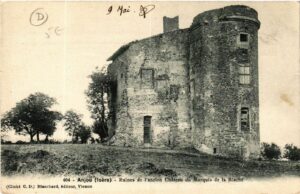This post was originally a thread which I posted on Twitter in October 2017, in response to this post on the Rejected Princesses site which was being widely linked to on social media during that time. Since Twitter’s long-term resilience is far from assured, and since Marguerite’s story is still being presented as accurate history on some online reference sites, I’m reproducing the thread’s info in an expanded form here.

The story of a fifteenth-century woman who was a “rapist-hunting knight” is the kind of story that many modern audiences want to be true—but while a woman Marguerite de Bressieux may well have existed, and have been assaulted during an attack against her family’s home, she never got vengeance on those who attacked her.
The earliest version of the tale of Marguerite which features her riding into battle against her rapist that I’ve been able to find is in a mid-nineteenth-century story collection by the French writer Alfred de Bougy (1814-1871). This collection is entitled Les mille et un romans, nouvelles et feuilletons (“A Thousand and One Novels, Short Stories, and Serials”). That, the fact that de Bougy was known in his lifetime for his historical fiction, and that the tale features lengthy passages of direct dialogue, are all arguments in favour of the story being at the very least heavily fictionalised—after all, how could someone 400 years later know what had been said on a battlefield?
Who, in the middle of a battlefield, is likely to pause and declaim a lengthy explanation of her actions, and ones that fit neatly into nineteenth-century gender norms, no less? (In de Bougy’s account, Marguerite says that she and her companions have “weak” arms but “strong, ulcerated” hearts, they were “dishonoured and therefore dead” to the world and unworthy of their families.) It just doesn’t pass the smell test.
De Bougy quoted, though did not name, one “chronicle” as the source of his story. I was able to identify that as an early modern text, the second volume of the Histoire de Dauphiné (1674). This was the work of the French lawyer and historian Nicolas Chorier (1612-1692), and was the first dedicated history ever published of this part of southeastern France. Chorier’s account (p. 46) paints a very different picture of the attack on the de Bressieux’s castle and its aftermath than does de Bougy’s:
[The soldiers] attacked [the castle of Anjou], having timed it so well that there was only the Lady of Bressieux; Marguerite, her daughter; and their servants. The castle was taken easily. The men were killed; the women raped. Not even the social rank of Marguerite de Bressieux was respected. She was used for the pleasure of the commanders and the soldiers. But she did not want to outlive her honor. She died a few hours after this cruel insult, her pain having punished her for the crime committed within her, although she was innocent of it.
Whether Marguerite died because of physical injuries suffered during the gang rape, or whether she took her own life, is left ambiguous—as, ultimately, are the sources that Chorier drew on.

De Bougy must have encountered the Chorier account and decided to draw on it, but more as a jumping off point for his imagination than anything else. There is no dramatically pleasing vengeance in the chronicle for Marguerite, no group of sister-soldiers who acquired combat training and (expensive!) armour and horses in order to track down their rapists, no punning battle banner, or burial with military honours.
There is just suffering and death.
De Bougy gave Marguerite the fictional last laugh—perhaps an understandable impulse—but Alfred Trenchant and Jules Ladimir repeated that fantasy as fact in their Les femmes militaires de la France: depuis les temps les plus reculés jusqu’à nos jours (1866). From there, eventually, this bit of misconstrued history made its way to the internet.
Marguerite’s story absolutely should be told, but sadly not as an example of an “exceptional” medieval woman defying the odds. Her memory is a reminder of all the women in the Middle Ages who suffered similar horrific assaults yet who are utterly lost to history—and of the importance of verifying our primary sources.

